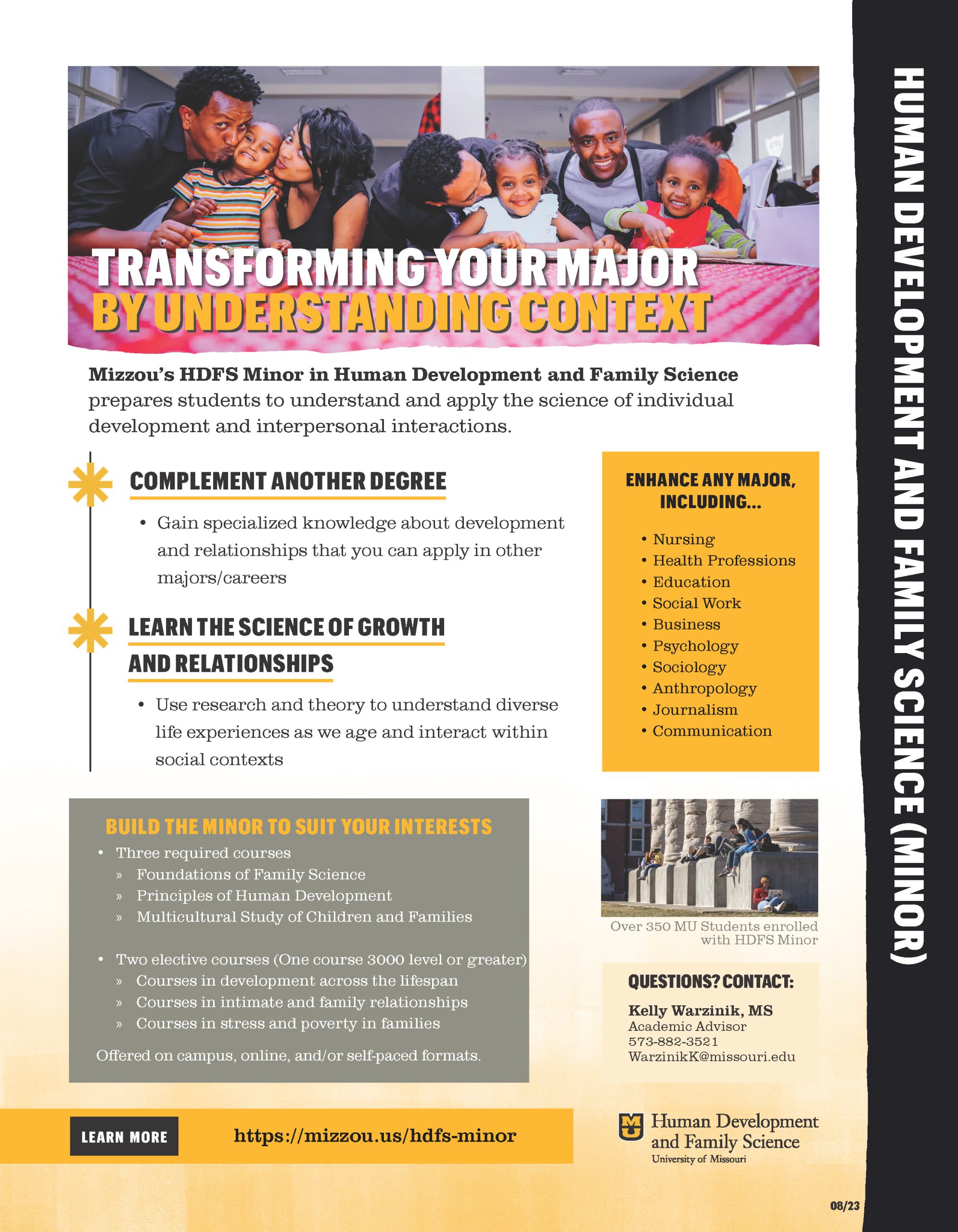A minor in HDFS prepares students to understand and apply the science of individual development and interpersonal interactions to any other field of study.
COMPLEMENT ANOTHER DEGREE
Gain specialized knowledge about development and relationships that you can apply to work in other majors/careers.
LEARN THE SCIENCE OF GROWTH AND RELATIONSHIPS
Use research and theory to understand diverse life experiences as we age and interact within social contexts.
BUILD PERSONAL LIFE SKILLS
Apply knowledge of development and relationships to your personal life and interactions as a child, sibling, partner, parent, friend, or coworker.
| Minoring in HDFS can enhance your major: | |
|---|---|
| Nursing and Health Professions | Enhance your work with patients of all ages with strong knowledge of normative development; Learn about the role of families and relationships in patient health and treatment. |
| Education | Understand cognitive and social developmental milestones and the importance of peer relationships; Learn how families and their social locations influence children’s growth and learning. |
| Social Work | Learn how environments and context influence the needs and resources of people you serve; Understand the role of relationships and development in service delivery. |
| Business | Understand youth and families as consumers; Enhance human resources programs that support development and relationships. |
| Psychology | Dive deeper into families, social, and cultural experiences as a context for individual growth; Apply a systems view to mental health and social cognition. |
| Sociology and Anthropology | Understand families as a key social structures within cultures; Focus on reciprocal influences of individuals and families in their social contexts. |
| Journalism | Identify how families consume and are influenced by media and social messages; Understand how to report on important youth and family issues. |
| Communication | Learn the role of communication in family and social systems; Create public relations and marketing campaigns for agencies that support children and families. |
| Engineering | Develop applied solutions that help individuals and families navigate the world around them; Understand how people interact with their physical environments. |
| Political Science | Understand how policies and government influence peoples’ everyday lives; Use developmental and relationship research to inform and advocate for policies that support individuals, children, and families. |
| Parks & Recreation; Natural Resources | Create recreation, sports, and outdoor programs that foster positive youth development; Understand how leisure and nature programs support social and cognitive development and enhance relationships. |
Apply for the HDFS Minor: Complete the online application. The application should be submitted when you begin taking HDFS courses to fulfill the minor and before all required courses are complete. Requirements in place at the time of application are the student’s responsibility.
Criteria and Coursework for the HDFS Minor
To earn a minor in HDFS, an undergraduate student must successfully complete 15-16 credit hours of coursework, as indicated in the two groups listed below. Students must earn a grade of C- or better in each course used to satisfy the minor requirements, and a minimum 2.00 GPA overall for the HDFS minor courses taken. Satisfactory/unsatisfactory (pass/fail) graded courses will not be accepted for the purpose of meeting minor requirements.
A total of 6 hours of transfer credit from other colleges or universities outside of the University of Missouri – Columbia will be accepted for the minor in HDFS, provided the transfer courses are a direct equivalent to MU HDFS courses.
A minor must be completed and awarded at the same time as the MU undergraduate degree (i.e., minors cannot be claimed after graduation). Once an HDFS minor is awarded, a student cannot return to MU to complete a second undergraduate major in HDFS.
Students cannot earn a major and a minor in HDFS.
Recent curriculum changes only apply to students applying Fall 2022 or later. Those who have already declared the HDFS Minor must continuing following the course requirements in place at the time they applied. Contact your advisor with questions.
Required (3 courses)
- HDFS 1600: Foundations of Family Science (3 cr)
- HDFS 2300: Multicultural Study of Children and Families (3 cr)
- HDFS 2400/2400W: Principles of Human Development (3 cr, standard or 4 cr, WI)
Additional courses (choose any 2 courses, some have pre-requisites so plan accordingly. At least 1 course must be at a 3000 or 4000 level.)
- HDFS 1234 Successful Adulting
- HDFS 1610 Intimate Relationships and Marriage
- HDFS 2450 Human Sexuality Across the Life Span
- HDFS 3050 Child Development: Infancy and Toddlerhood
- HDFS 3150/3150W: Child Development: Preschool to Pre-Adolescence (3 cr, standard or WI)
- HDFS 3430 Adolescence and Young Adulthood
- HDFS 3440 Adulthood and Aging
- HDFS 3550 Technology and Young Children (3 cr)
- HDFS 3600 Partnering with Parents and Families
- HDFS 3650 Lives of Young Children and Families (3 cr)
- HDFS 4200 Latino/a Children, Youth, and Families
- HDFS 4300 Black Children, Youth, and Families
- HDFS 4610 Stress and Resilience in Families
- HDFS 4620 Family Interaction
- HDFS 4640 Interpersonal Relationships
- HDFS 4700 Children and Families in Poverty
- HDFS 4720 Child and Family Advocacy
HDFS Minor Advisor
 Kelly Warzinik
Kelly Warzinik
Phone: (573) 882-3521
E-mail: warzinikk@missouri.edu
